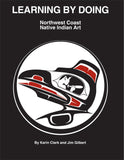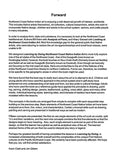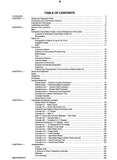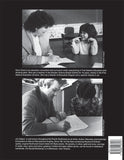Learning by Doing Northwest Coast Native Indian Art
Learn and teach Native art drawing, painting, and carving in Pacific Northwest Coast art styles.
Use this book to learn and teach Native art drawing using Pacific Northwest Coast art styles.
First published in 1987, Learning by Doing Northwest Coast Native Indian art, by Karin Clark and Jim Gilbert, is a helpful guide for anyone interested in Pacific Northwest Coast Native art drawing, painting, and carving styles.
The book was initially developed as a straight-forward, useful, and enjoyable curriculum to be used in any educational classroom or workshop setting or as a great place to start for those with a personal interest in Northwest Coast art.
It includes step-by-step, native art drawing, painting, and carving tutorials perfect for meeting K-12 teachers’ Indigenous-focused curriculum expectations.
If you’re a K-12 teacher, this book is a culturally accurate grab-and-go resource you can use immediately in the classroom without having to spend hours researching and preparing materials that integrate Aboriginal worldviews and perspectives into the classroom.
More about Learning by Doing:
· Step-by-step instructions and illustrations on the basics of drawing, designing, painting and carving in the Pacific Northwest Coast Native Indian art style.
· Fifteen educationally based concepts arranged from simple to complex, with each step building on the previous.
· Over 300 black and white detailed illustrations and 32 photos enhance and clarify the straightforward instructions.
· Durable soft cover, black and white, 160 pages.
· 5 in x 11 in
· First published in 1987 and reprinted in 1990, 1993, 1999, 2001, 2003 and 2017.
· Bonus: You'll find an unpainted version of a native Raven head design on page 154, a perfect tool for practicing how to draw a native raven head in Northwest Coast art style.
About the Native Raven art on the cover of Learning by Doing
The Native Raven design on the cover of Learning by Doing is the same design we use for Raven Publishing’s logo. Based on an idea that flashed as she watched a student at work, Karin Clark designed it and Jim Gilbert drew and painted it.
The design represents a young Raven, who in Pacific Northwest Coast Indigenous culture is considered a crest figure and responsible for, among other things, the creation of or stealing of light in the form of the sun, moon, and stars and finding earth’s people while they were still hiding in the dark and giving them the light. Although Raven is a famous trickster and shape-shifter, we do not emphasize this aspect of its character. We believe students can learn this on their own.
Within our logo, Raven, the teacher, provides children with learning experiences that encourage their educational growth, development, and understanding. Depicted in typical Northwest Coast Native art style, Raven is the teacher whose eye reflects a student hard at work.
Table of Contents
Forward
Chapter 1
Scope and Sequence Chart
Introduction and Theoretical Construct
Instructional Techniques
Justification and Need
Chapter 2 - Review of the Literature
Map
Northwest Coast Native Indian Cultural Background information
Contexts of Northwest Coast Native Indian Art
Ethnography
Native Art
Recognition of Native Art as an Art Form
Kwagiulth Artists
Skills
Curriculum
Curriculum Model
Patterns of Instructional Programming
Methodology
Time
Interaction Patterns
Learner Needs
Supportive Environment
Program and Student Evaluation
Reporting
Present Day Development of Curriculums of Native Indian Art
Chapter 3 - Goals and Objectives
Goals
Objectives
Evaluation
Handout Materials:
Rating Scale - Teacher Program Evaluation
Rating Scale - Parent/Guardian Evaluation
Questionnaire - Teacher Self-Evaluation
Questionnaire - Student self-Evaluation
Questionnaire - Student Course Evaluation
Example of a Criterion-Referenced Test
Concept Checklist
Group Record Card
Chapter 4 - Teaching/Learning the Concepts:
Native Indian Art Displays
Concept # 1 - Basic Ovoid
Concept # 2 - Ovoid with Eyelid line
Variations and Styles of Eyes and Eyelid Lines
Concept # 3 - 'U' Shape
Concept # 4 - Split 'U'
Split 'U' Forms and Common Mistakes - Test Paper
Concept # 5 - Reverse Split 'U'
Concept # 6 - Variations in 'U' Shapes
Additional Variations in 'U' Shapes - Chart
Concept # 7 - 'S' Shaped Box End Design
Concept # 8 - Salmon-Trout Head
Concept # 9 - Killer Whale Head
Concept # 10 - Eagle Head
Concept # 11 - Knife Handles
Concept # 12 - Bas-Relief Whale
Concept # 13 - Bas-Relief Eagle (Interior Areas Carved)
Concept # 14 - Carved Serving Tray
Concept # 15 - Ceremonial Paddle
Chapter 5 - Implementation:
Costs
Possible Uses
In-Service or Other Preparatory Activities
Materials
Line Drawings
Bibliography
Check out the "Learning By" series








